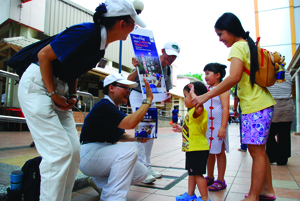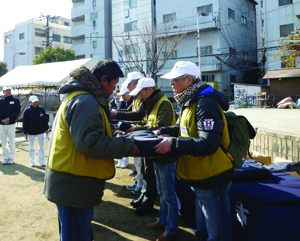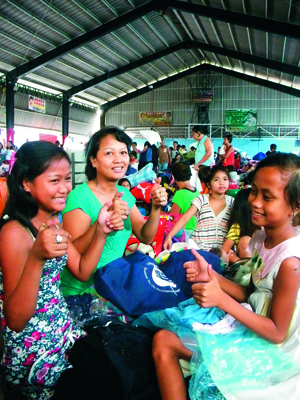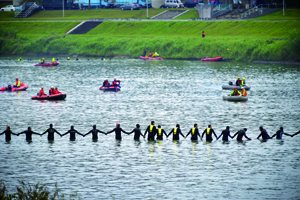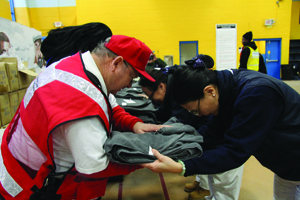

| Tzu Chi Events Around the World | ||||||||||
Singapore On January 4, to help flood victims in Malaysia, 707 volunteers from Tzu Chi Singapore hit the streets, donation boxes and posters in hand, kicking off a fundraiser that would last a month.
The volunteers went to markets, shopping malls, bus stops, and MRT stations to solicit donations. With smiles on their faces, they beseeched passers-by to give. Each donation was met with a low bow and a cheerful “Thank you and bless you.” The Geylang Serai market is a gathering place for local Malays. The volunteers received much attention there as they called, “Show your love, support Malaysian flood victims.” Many people expressed their support by depositing money into the boxes. Rahima, a 65-year-old donor, said that she was very concerned about her brother and his family. The family had to stay in a shelter because their house in Gua Musang, Kelantan, Malaysia, had been submerged. Rahima could not visit them because transportation had been cut off. When she heard about Tzu Chi volunteers distributing emergency cash and relief supplies to flood victims, she was very touched by how they gave without regard to ethnicity and religion. Masitah, a Malay mother, said that Tzu Chi did the right thing to take to the streets to raise money. Doing so taught children the meaning of charity. She asked her son to drop money into a donation box and explained to him that the money would go to help flood victims in Malaysia. Volunteer Li Shu Fang (李淑芳) said that she had probably called out 6,500 times that day to solicit donations, from seven o’clock in the morning until six in the evening. Though her feet were sore and her voice was hoarse after standing and yelling all day long, those were small problems that would go away in a couple of days, compared to the much longer time it would take for flood victims to rebuild their lives. “When a disaster strikes, the fortunate ones should chip in and help the less fortunate,” she said. Volunteer Xu Yu Bao (許毓寶) had gone to the flood zones in Malaysia to help with Tzu Chi relief work there. “What I saw was beyond my imagination.” She said that though many brick houses were undamaged, the things inside, like furniture, were still flooded and damaged. Some people lived in stilt houses, but the deep water stranded them in their homes all the same. To buy necessities, they had to row out on Styrofoam boxes. Life became difficult for some people as they could not work and had no income. Born and raised in the richness of Singapore, Xu did not know if she could have hung in there as well as those flood victims had. Witnessing the suffering of others helped her count her blessings. She was especially touched when she saw some flood victims return or decline the emergency cash that Tzu Chi volunteers had handed over to them. They wanted Tzu Chi to give the money to others worse off than themselves. By soliciting donations and pooling together the love of many people, volunteers hoped that they could help the flood victims feel the warmth of the world. Japan Tzu Chi volunteers in Osaka held their inaugural winter aid distribution on January 11, 2015. Before the event, volunteers went over the distribution procedures and other related matters. Six homeless people would help maintain order, check recipients in, and hand out numbers.
Of the volunteers, six were Japanese males. One of them, Shogo Nakamura, didn’t use to know much about Tzu Chi. When his Taiwanese wife, Qiong-zhu (瓊珠), talked about going with Tzu Chi volunteers to help survivors of the tsunami that hit northeastern Japan in March 2011, his first thought was to oppose it. But since the disaster had occurred in his country, he felt it wasn’t right to stop her from going. After she had left for the relief mission, he felt greatly inconvenienced by her absence at home, so he later told her not to go again. However, when his wife wanted to go again, Nakamura did not stop her. By that time, he had seen how much Tzu Chi, headquartered in Taiwan, had done for tsunami victims in northeastern Japan. He felt ashamed of himself—he should have done more to help his own people. As a result, he began going with his wife to visit the needy, pray for the deceased, and participate in other Tzu Chi activities. The more he participated, the more deeply he felt that Tzu Chi was indeed helping those really in need. This is when he became completely committed to Tzu Chi work. Ikuma Sugiura, a junior at Kyoto Sangyo University, traveled from Kyoto for this event. When he heard a teacher mention the good deeds that Tzu Chi was doing around the world, he became curious and wanted to know more about the organization. He felt Japan needed this type of unselfish spirit of benevolence. He also wanted to know how Master Cheng Yen was able to lead so many volunteers, so he visited the Tzu Chi Japan branch in Tokyo and learned more about the work of the foundation around the world. He decided to go to Hualien, Taiwan, in 2015 to experience firsthand the life of a volunteer there and the life of the nuns in the Jing Si Abode, the Tzu Chi headquarters. Iwao Nishioka, himself a homeless person, was the liaison between the recipients and Tzu Chi. He said the distribution of blankets was very helpful to the homeless in the bitter cold of winter, and he was grateful for Tzu Chi’s assistance. He asked the volunteers if they could give out more blankets in the future to help more homeless people. The original plan for this event was to distribute between two and three hundred blankets, thermal undershirts, towels, and gloves. However, the volunteers in Osaka were uncertain that they had the manpower and expertise to carry out such a big event in their first attempt. Therefore, they scaled it down to just 80 blankets and towels. One homeless person dropped 500 yen (US$4.20) into a Tzu Chi coin bank to show his gratitude. He said, “I don’t have much to give—this is a small token of my desire to help other needy people. I hope that you don’t mind its size.” The volunteers hope to establish deeper connections with the homeless and to give them more spiritual support. They hope to help them return to society and live normal lives again. The Philippines On January 1, 2015, a severe blaze, believed to have been started by firecrackers, left nearly two thousand families in Quezon City homeless. Tzu Chi volunteers promptly went to assess the disaster zone. On January 3 and 7, Tzu Chi Philippines conducted relief distributions for 1,978 families that had been placed in two shelters. In addition to emergency cash—one thousand pesos, or US$22.57, for each family—items including reusable bags, comforters, cooking pots, laundry soap, dish detergent, second-hand clothes, dining utensils, and rice were distributed.
Francisco Quiapo, a carpenter, lost all his possessions in the fire. He said he would use half of the emergency cash to buy new tools for his trade, and give the other half to his wife to buy daily goods. Another aid recipient, Salome Cagampang, thanked Tzu Chi for the aid. She observed that the money could help her set up a vegetable stand again. Rosalinda Abaya also expressed her gratitude to Tzu Chi; the cash she had received would be used toward the purchase of building materials for a new house. In the face of a disaster, only love can help the affected out of suffering. May the love from Tzu Chi help the fire victims restart their lives and ease their way back to normalcy. Taiwan On February 4, TransAsia Airways flight GE235 from Taipei to Kinmen lost power soon after takeoff from Taipei Songshan Airport and crashed into the Keelung River. Fifty-three passengers and five crew members were on board. Before the crash, the left wing of the plane clipped a taxi running on an elevated expressway. Both the taxi driver and passenger were injured, but not seriously. The crash took the lives of 43 people on the plane. Tzu Chi volunteers quickly set up a service station near the site. They gave whatever assistance was needed, and they served hot food and ginger tea to rescue workers and crash victims’ families as the search for missing passengers went on. Volunteers also visited survivors at hospitals and went to the Second Funeral Parlor to chant sutras for the deceased.
Of the passengers aboard, 31 were from Xiamen, China, so Tzu Chi volunteers in that city also mobilized to help. Seven of them even accompanied family members from Xiamen to Taiwan, where they were picked up by other volunteers. In their rush to come to the island, some of the relatives didn’t bring enough clothes. Volunteers immediately went about preparing clothes and other needed items for them. Many rescue and search divers were volunteers from private groups. At their request, Tzu Chi volunteers provided two tents for them to change clothes and rest. The temperatures were low, and the river must have felt like ice water to the rescue workers. As soon as they emerged from the river, volunteers quickly handed them hot tea and blankets. Chen Jia-hao (陳嘉豪), a rescue worker, thanked Tzu Chi volunteers for taking care of them. “The hot tea and food you serve really help us keep up our strength.” By February 12, all the missing passengers had been found. During the nine days after the crash, Tzu Chi volunteers put in more than 11,000 person-times to help. They cared for rescue workers and family members, chanted sutras for the deceased, provided hot food, gave out supplies such as scarves, blankets, and hand warmers, and presented emergency cash to the injured and family members. They wove a close-knit web to provide staunch support for rescue workers and family members. United States A blizzard struck the Northeast on January 27. New Jersey was lucky to avoid the forecasted snowstorm, receiving only two to ten inches of snow. However, the frigid temperatures were still a threat to homeless people. To care for them, the City of Newark opened the JFK Recreation Center as a temporary shelter. The day before the blizzard, 186 homeless people stayed there. More were expected to move in on the 27th.
Jocelyn Gilman, community chapter executive at American Red Cross Northern New Jersey Chapter, contacted the Tzu Chi New Jersey branch and requested 150 blankets for the homeless. On the 27th, 12 volunteers delivered 160 blankets and 200 scarves to the shelter. When they arrived, workers at the shelter and Red Cross staff helped unload and take everything inside. Tzu Chi volunteers saw row after row of folding cots in the shelter. Because of the improved weather conditions, many homeless people had gone elsewhere; only about 80 people were in the shelter. When volunteers approached the beds, they saw only thin blankets or even plastic sheets, nowhere near enough to keep the residents warm in the cold weather. Louise Scott-Rountree, a staff member from the mayor’s office, thanked Tzu Chi volunteers on behalf of the mayor. She said that the city does not have a permanent shelter for the homeless. But whether it snows or not, whenever the temperature falls below 17 degrees Fahrenheit (-8 degrees Celsius), the city uses the recreation center as a temporary shelter for the homeless. At the recreation center, volunteers introduced Tzu Chi to everyone, and invited them to the upcoming Tzu Chi year-end blessing ceremony. |













|

